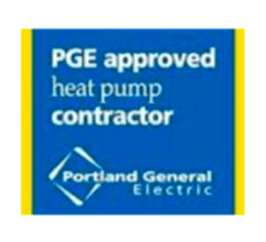This post was originally published on March 19th, 2019, and last updated on April 13th, 2022.
Twenty years ago, air conditioning was a luxury for many of us in the Pacific Northwest. This has changed in recent years. The summers have been getting hotter and hotter, and AC has gone from a luxury home upgrade to a basic necessity for many individuals and families. In fact, we’ve seen a huge uptick in air conditioning installation requests over the past few years. Air conditioning is an investment in your home and daily comfort. While AC installation costs vary depending on the type you choose, the size of your home, and more, it’s usually a worthy investment.
Are you thinking of installing air conditioning in your home to keep you cool during the hot summer months? Cost is a major consideration for many homeowners looking to add AC.
In fact, when it comes to installing new AC systems or replacing old ones, one of the first questions we often get is: What is it going to cost? Keep reading to find out how much you can expect to spend.
Table of Contents
- How much does it cost to install a new Air Conditioner and Ductwork?
- How much does it cost to replace an Air Conditioner with Existing Ductwork?
- How much does it cost to replace a Furnace and Air Conditioner?
- How much does it cost to replace a Compressor in an Air Conditioner?
- How much does it cost to replace an AC Capacitor?
Factors for Determining AC Installation Cost
The cost of installing home air conditioning depends on a variety of different factors, including the following:
1. Square Footage
The cost of installing an AC system depends on the size of your home and the size AC you need for it. For larger spaces, you’ll need a more robust and customized system. However, thanks to advancements in home-cooling technology, it’s easy to keep even the largest of homes cool and comfortable – all the way from basements to top-story bedrooms.
2. Desired Level of Comfort
Do you want to be able to cool your entire home? Or are you more concerned about maintaining a comfortable temperature in specific spaces within your home? Will you keep the AC on 50% of the time or 100% of the time during the hot months? Installation cost will depend on both square footage and your desired level of comfort.
3. Home Efficiency
If you have great insulation, few west-facing windows, and adequate tree coverage, your home likely already does a good job of naturally staying cool during the hotter months. However, if you have a lot of natural light and poor insulation, you’re going to need a more robust system to keep your living spaces cool and comfortable.
4. Desired Efficiency
In simple terms, AC efficiency is the ratio between the amount of heat that’s removed and the power used to cool the space. This is generally discussed using a system’s “SEER” rating. It’s important to consider what level of efficiency is best suited to your home and preferences. Depending on where you live, there may be specific efficiency requirements. In Portland, for example, the government requires us to sell equipment that is 13 SEER or higher. However, in 2023, these regulations will tighten to a minimum SEER of 14 for the northern U.S., which will likely result in higher equipment prices.
Energy efficient air conditioners may be more expensive up front, but you’ll benefit over time from lower monthly utility bills and overall utility costs.
5. Noise Requirements and Sensitivity
Are you sensitive to continuous humming and/or buzzing sounds? Or does your HOA have noise restrictions? If you’re noise-sensitive or need to adhere to specific noise-related requirements, you’ll want to consider a quieter model. Fortunately, thanks to new technology, we have lots of quiet options available!
6. Type of System
The cost of installing an AC unit in your home may depend on the type of AC system you choose. There are many different types of systems to consider. From a central air conditioner to a heat pump to a ductless AC unit, and there are pros and cons to each. When you speak with one of our consultants, we can customize a solution that works best for your particular home, needs, lifestyle, and preferences.
7. New or Replacement System
Are you installing AC in your home for the first time? Or are you replacing an outdated system? When replacing an outdated or inefficient system, the cost of installation is generally lower than for first-time installs.
AC Installation and Replacement Costs
Considering all the different variables and the number of options available, the cost of air conditioner installation can vary quite a bit. Central AC units generally start around $5,000 and run up to about $10,000.
For ductless systems, prices start around $5,500 and can go up from there. While ductless is more expensive than a central AC unit, it has countless benefits, which are all outlined on our blog about the pros of ductless systems. One of our favorite benefits is zoning, which allows you to separately control which rooms or areas of your home you want to keep cool at any given time.
How much does it cost to install a New Air Conditioner and Ductwork?
The cost of AC installation can vary depending on many different factors, such as the size of your home, the type of AC system you choose, and whether or not you already have ductwork. If your home doesn’t have existing ductwork, installing a furnace, AC and ductwork would generally cost between $20,000 and $30,000.
How much does it cost to replace an Air Conditioner with Existing Ductwork?
Replacing an air conditioner when your home has existing ductwork is significantly less expensive than installing a brand new system. That’s because each duct run adds cost, especially when you’re replacing solid ducts in walls or ceilings. Typically, you can expect to spend between $5,000 and $10,000 for a new system when your home has pre-installed ductwork, depending on a variety of factors, including your home’s size and efficiency.
How much does it cost to replace a Furnace and Air Conditioner?
A furnace/AC combination is a popular choice for many homeowners, as “matched” systems can provide increased energy efficiency and optimized indoor comfort. Rather than paying separately for a furnace installation and a replacement AC, if you need both installed or replaced, it often makes logical and financial sense to replace both units at the same time. This generally costs somewhere between $9,000 and $16,000 but varies depending on the type of system you choose and the heating and cooling requirements of your home.
How much does it cost to replace a Compressor in an Air Conditioner?
A compressor is essentially the heart of an AC system. It takes the refrigerant from a gas state to a liquid one and keeps it pumping through the system — much like the heart does with blood in the body. In many cases, a dead compressor is a sign you need to replace the entire system, especially for older models that are unlikely to last much longer. However, there are many cases where just replacing the compressor is the most efficient and affordable option, especially if the manufacturer’s warranty covers it. Most compressors cost somewhere between $1300 and $3000, depending on the system.
How much does it cost to replace an AC Capacitor?
Capacitors are components within your air conditioner’s outdoor condensing unit and in the furnace and work to power the motor and keep your system running. Replacing an AC capacitor is usually a relatively quick and inexpensive process, as long as you have a qualified and knowledgeable installer. Prices typically range from $300 to about $500, including the part and labor. It’s important to note that, although you can often buy an AC capacitor online unless you have significant HVAC experience, it’s always best to hire a professional contractor for a capacitor replacement, as the process can be potentially dangerous.
Additional reading: Do You Need Air Conditioning in Portland?
Ductless AC Costs
A ductless air conditioning system is a great option if your home doesn’t have existing ductwork. Ductless ACs are often referred to as “mini-splits,” and they’re actually a type of heat pump. There are some unique benefits to ductless systems. One of the biggest advantages is the “zoning” feature, where you can adjust the temperature of each indoor unit separately, allowing you to heat or cool areas in your home to different temperatures depending on what rooms are being used via separate remote controls.
Ductless ACs are relatively expensive to install, ranging from $5,500 to $10,000 or more, depending on the number of indoor units you have installed. However, despite the higher installation cost, mini-split systems save you tremendously on energy costs in the long run due to their unique efficiency technology. If you’re planning to stay in your current home for the foreseeable future, it’s often a worthwhile investment.
AC Costs by Ton, SEER Rating, & Brand
It goes without saying that the cost of an AC installation depends on a number of different factors such as type, size, brand and manufacturer, and SEER efficiency ratings. Efficiency impacts price, both upfront and in the long run. A system with a higher SEER rating will cost more upon installation. However, high-efficiency systems can also save you money in the long run as yearly electricity costs are lower, often by thousands of dollars.
ACs are not all created equal. That’s why it’s also important to consider brands when looking for a reliable AC system. We install Carrier because it’s a time-tested brand that utilizes higher-quality and longer-lasting components that don’t require extensive upkeep.
Investing in a New AC
Cooling our homes with technologically advanced HVAC systems used to be considered a luxury. Now, with summer temperatures hotter than ever before, AC is a requirement for many homeowners. When you replace or install AC, you invest in your daily comfort, health, productivity, energy levels, and even your home’s market value. In fact, experts estimate that having air conditioning installed can increase a home’s value by about 10%.
An AC installation can be expensive, but it can also add measurable value and improve the quality of life in your home. Jacobs Heating & Air Conditioning offers financing options and payment plans, and we’re here to help you navigate the budgeting process so you can stay cool and comfortable during the hot summer months without breaking the bank.
AC Maintenance
Regular maintenance is an important aspect of caring for your home’s HVAC system, avoiding emergencies, and extending your system’s life. Nothing’s worse than investing in an effective, comprehensive home-cooling system only to have it quit on you in mid-July when you need it the most. Opting for yearly HVAC maintenance and tune-ups is significantly less than the costs associated with repairing or replacing an HVAC unit that’s been neglected for years.
Benefits of Air Conditioning
With significant advances in home-cooling and energy-saving technology in recent years, we’re seeing an increasing number of benefits to air conditioning. AC has become more efficient and better at optimizing comfort. Additionally, with the use of a zoning system, which allows you to only cool certain rooms or areas at a time, you can minimize your environmental (and economic) footprint by only cooling the parts of your home that need it the most.
In addition to increased comfort, air conditioning systems can also be a good choice to protect yourself from environmental pollutants. We’re seeing a huge upsurge in summer forest fires, which has been impacting the outdoor air quality. In the summer months, with AC, you won’t need to open windows to keep your spaces cool. You can improve your indoor air quality by only bringing in conditioned, filtered air.
We’re Here to Help With Your Home Heating & Cooling Needs
At Jacobs Heating & Air Conditioning, we carry the highest-quality equipment and systems from the leading brand, Carrier®, who actually invented air conditioning! You can explore our wide-ranging selection here.
At Jacobs, we’re always here to provide our clients transparent, accurate, and fair estimates about new installs or system updates. If you’re interested in getting a specific quote, we’d love to help. Reach out to us at any time online or complete a service request form to get started. We’re here to answer any questions you have and help you make the best decision for your home and family.










